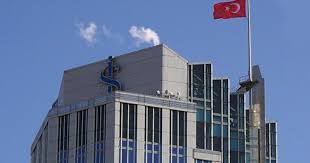Turkish President Recep Tayyip Erdogan on May 12 asked the central executive committee of his Justice and Development Party to speed up plans for the government to take over a 28 percent stake in Isbank, the country’s largest publicly listed lender. Erdogan is scrambling for resources amidst Turkey’s COVID-19-induced economic downturn, which has depleted the country’s net international reserves, excluding swap lines. Yet this effort is likely to further erode investor confidence and exacerbate Turkey’s economic woes.
Is Bank has been a mouthwatering target for right-wing governments
This is not the first time that the Turkish president has set his sights on Turkey’s leading bank. In October 2018, Erdogan first floated the idea of transferring Isbank shares to the treasury, a threat he repeated in February 2019 and February 2020. All three of Erdogan’s previous attempts led to a significant drop in the bank’s shares and a public outcry, preventing him from going forward. It is not clear whether the Turkish president is testing the waters with his fourth call or simply trying to divert public attention away from economic mismanagement by his son-in-law, Minister of Finance and Treasury Berat Albayrak.
The Turkish president’s motivations for targeting Isbank are as much ideological as economic. Turkey’s pro-secular main opposition, the Republican People’s Party (CHP), appoints four of the bank’s board members. This has been the policy since Mustafa Kemal Ataturk – the founder of the Turkish Republic, the CHP, and Isbank – bequeathed his shares to the party upon his death in 1938. The CHP acts as the trustee of the dividends allocated to the Turkish Linguistic Society and the Turkish Historical Society, two institutions central to Ataturk’s secular vision for the country.
Reportedly, Erdogan’s aides disagree about whether the treasury can legally take over the bank’s shares by annulling Ataturk’s will.
Historically, there were two short-lived attempts to take over the bank, first by a government led by CHP’s rivals in 1953 and then by a military junta in 1981. Both failed, as Turkish courts ultimately overturned these partisan expropriation attempts. Nevertheless, challenging Isbank and the CHP remains a goal of Turkey’s Islamists, including Erdogan. It represents a struggle for the very soul of the country, as the Islamists seek to undermine the legacy of Turkey’s founding father and his secularizing institutions and reforms.
Is Bank, a beacon of good governance
Isbank, 32 percent of which is publicly traded, with another 40 percent owned by the lender’s pension fund, continues to be a beacon of good governance. This stands in stark contrast to Turkey’s public banks, which burned through $32 billion of foreign currency during the first four months of 2020. As The Economist observed, these lenders mounted an “unwise and ineffective” defense of the Turkish lira on behalf of the central bank.
Turkey’s banking sector is already under significant scrutiny. The country’s second-largest public lender, Halkbank, faces criminal charges in a Manhattan court for helping Iran illicitly transfer tens of billions of dollars in one of the biggest sanctions-evasion schemes in history. Notably, Isbank stood out as a financial institution that Reza Zarrab, the scheme’s Iranian-Turkish ringleader, avoided in his transactions.
Erdogan hopes to manipulate the Turkish news cycle for a few more weeks, thereby distracting from embarrassing reports of Turkey’s cratering economy. But his plan is not likely to succeed. The CHP leadership has already decided not to respond to his threats, effectively killing the debate before it begins. Washington should now urge Erdogan to focus his energies on much-needed economic reforms rather than financial chicanery involving banks already under great strain.
Aykan Erdemir is a former member of the Turkish parliament and the senior director of the Turkey Program at the Foundation for Defense of Democracies (FDD), where he also contributes to FDD’s Center on Economic and Financial Power (CEFP).
You can follow our English language YouTube videos @ REAL TURKEY: https://www.youtube.com/channel/UCKpFJB4GFiNkhmpVZQ_d9Rg
And content at Twitter: @AtillaEng
Facebook: Real Turkey Channel: https://www.facebook.com/realturkeychannel/
